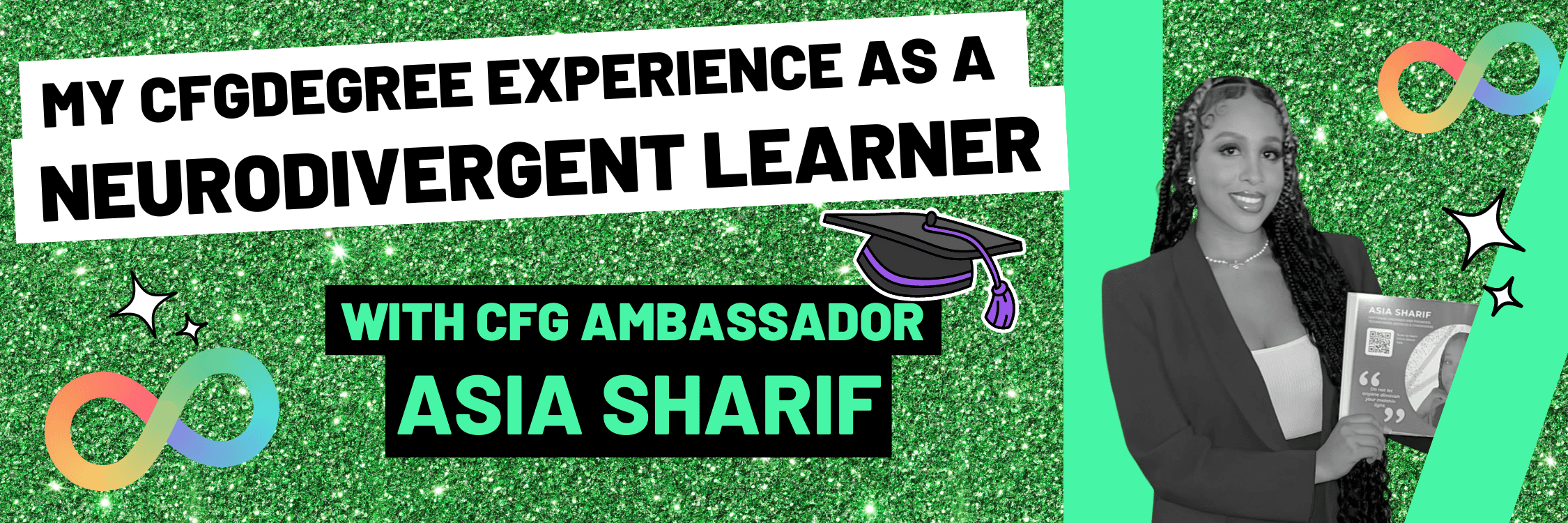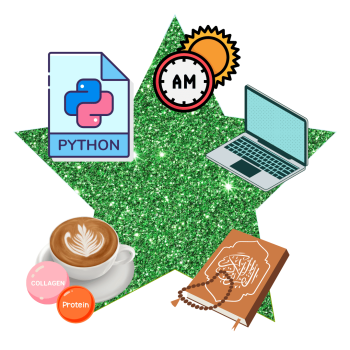Neurodivergent friendly coding courses | Asia Sharif’s story
Home » Neurodiversity in Tech | Asia’s CFGdegree Experience

CFG Ambassador Asia discusses Neurodivergent friendly coding courses & her experience learning on the CFGdegree
💻 Code First Girls Ambassador Asia Sharif reflects on her experiences studying the CFGdegree as a neurodivergent learner with ADHD and OCD. Asia shares how embracing her neurodiversity allowed her to thrive in tech, strategies she used to manage the workload of the CFGdegree, and advice for other neurodivergent individuals who wish to pursue to career in tech. To read more about Asia’s journey and CFGdegree tips, feel free to connect with her on LinkedIn!
THE HOT SIX QUICK FIRE QUESTIONS!
- Favourite coding language? (if you have one!)
- Python
- What is your choice of beverage for coding
- Collagen Protein Coffee
- Desk set up – RGB, Minimal or my aesthetic
- My aesthetic
- If you had to only use one for life: Laptop or PC?
- Laptop
- Are you most productive in the morning or evening/night?
- Morning
- What do you listen to whilst you code and where? Spotify, radio, vinyl or fave CD?
- Quran or nothing – I enjoy silence

👋 Hi Asia, thank you for taking part in this article! Please give a brief intro about who you are, your tech experience, what you do professionally, and why you want to become a CFG Ambassador.
Hey everyone! I’m Asia Sharif, a multi-award-winning software engineer, public speaker, engineering mentor, and Ambassador passionate about leveraging technology to drive positive change. With a background in sales and fundraising, I made a career transition into the tech industry, driven by my curiosity and desire to make a meaningful impact. In my professional journey, I currently am a Software Engineer at NatWest, where I mostly work with data, which is great because one of my goals is to move into machine learning.
My experience in this role has allowed me to develop a deep understanding of multiple software and technologies as well as develop my communication and leadership skills, enabling me to contribute effectively to our team’s success. My journey into the tech world has been inspiring, and filled with challenges and opportunities for growth. Despite not having a traditional computer science background, I embraced the challenge and immersed myself in learning and acquiring new skills. This journey has taught me the importance of resilience, adaptability, and continuous learning in the ever-evolving tech landscape.
Becoming a CFG Ambassador is a natural extension of my commitment to empowering individuals, particularly women, in the tech industry. I am passionate about creating inclusive spaces where everyone has the opportunity to thrive and succeed. As a CFG Ambassador, I am excited to collaborate with like-minded individuals, share my knowledge and experiences, and support others on their journey to achieving their goals in tech. Together, we can inspire and empower the next generation of tech leaders, driving positive change and fostering a more diverse and inclusive tech community.
🤔 What are some common misconceptions about neurodiverse individuals who work in tech?
Some assume they lack social skills, creativity, and focus, hindering their performance. However, neurodiverse individuals often excel in problem-solving and offer unique perspectives, fostering innovation. Contrary to belief, they can possess hyperfocus abilities, enabling deep concentration on tasks. While communication styles may vary, neurodiverse individuals excel in written communication and technical documentation.
Lastly, there’s a misconception that neurodiverse individuals face limited career advancement. With appropriate support, they contribute valuable insights and expertise, thriving in their roles and advancing in their careers. By debunking these misconceptions, we create more inclusive environments where neurodiverse individuals can fully realise their potential in the tech industry.
“By seeing my neurodiversity as a strength, I learned to use my unique traits to overcome challenges and keep learning. With a positive attitude and some help, I’ve shown that having a different way of thinking, a growth mindset, can actually be a good thing on the learning journey. ”
⛰️ Have you encountered any barriers or obstacles in your learning journey due to your neurodiversity? How have you overcome them?
Navigating learning with neurodiversity, like OCD and ADHD, has had its challenges. ADHD made it hard to focus, and OCD made me doubt myself a lot. But I found ways to deal with them. I made structured routines and used organisational tools to help with ADHD, and I learned mindfulness to manage OCD-related anxiety. Getting support from mentors and friends also helped a lot. By seeing my neurodiversity as a strength, I learned to use my unique traits to overcome challenges and keep learning. With a positive attitude and some help, I’ve shown that having a different way of thinking, a growth mindset, can actually be a good thing on the learning journey.
💜 In what ways has the CFGdegree accommodated neurodivergent individuals? Can you expand on your experience(s) with that?
The CFGdegree has been incredibly accommodating for neurodivergent individuals like myself. One of the most significant ways they’ve done this is through their flexible learning approach. They understand that neurodiverse individuals may have unique learning styles and needs, so they provide various resources and support options to accommodate them. For example, they offer recorded lectures and materials, allowing learners to review content at their own pace, which is beneficial for those who may struggle with traditional classroom settings or need extra time to process information.
Additionally, the CFGdegree provides a supportive community where neurodivergent individuals can connect with peers and mentors who understand their challenges and can offer guidance and encouragement. This sense of belonging and understanding is crucial for neurodiverse learners, as it fosters a safe and inclusive learning environment where they can thrive.
Personally, my experience with the CFGdegree has been incredibly positive. As someone with ADHD and OCD, I’ve appreciated the flexibility and support provided by the program. The ability to learn at my own pace and access resources when needed has been invaluable in helping me stay engaged and motivated throughout the course. Moreover, the sense of community within the CFGdegree has allowed me to connect with other neurodivergent individuals who share similar experiences, providing a supportive network that has helped me overcome challenges and succeed in my learning journey. I always used to get average marks, until I did the CFGdegree, and with their support, I got a Distinction.
Their inclusive approach ensures that all learners, regardless of neurodiversity, have the opportunity to pursue their passion for technology and achieve their goals.
📖 How did you manage the CFGdegree schedule and workload?
Managing the schedule and workload of the CFGdegree was indeed challenging, especially with the deadlines for homework and exams. However, with the support and resources provided by the program, I was able to navigate these challenges effectively and thrive in my studies.
One key strategy I employed was creating a structured study plan to manage my time efficiently using TrelloBoard. I prioritised tasks based on deadlines and importance, allocating dedicated time slots for studying, completing assignments, and preparing for exams. This helped me stay organised and focused, ensuring that I could meet the program’s requirements while balancing other commitments.
Additionally, I took advantage of the resources offered by the CFGdegree, such as recorded lectures, study materials, and networking. These resources allowed me to review content at my own pace and seek clarification on challenging topics, helping me stay on track with my studies and address any areas of difficulty.
Moreover, I made effective use of support networks within the CFGdegree community, such as mentors/instructors, peers, and support staff. I reached out for assistance when needed, whether it was seeking clarification on course material or requesting additional support for managing workload stress. The guidance and encouragement I received from these sources were instrumental in helping me overcome challenges and maintain momentum in my studies
“As someone with ADHD and OCD, I’ve appreciated the flexibility and support provided by the program. The ability to learn at my own pace and access resources when needed has been invaluable in helping me stay engaged and motivated throughout the course.”
💫 Is there anything you wish you knew before applying for the CFGdegree as a neurodivergent learner?
Before applying for the CFGdegree as a neurodivergent learner, I wish I had known more about the specific accommodations and support available for individuals like myself. While the program did provide resources and assistance, having a clearer understanding of how they catered to neurodivergent needs would have been beneficial.
Additionally, I wish I had been more aware of the potential challenges I might face in managing the workload and adapting to the learning environment. Having a better understanding of these challenges would have allowed me to prepare more effectively and develop strategies to address them proactively.
Furthermore, I would have appreciated knowing more about the experiences of other neurodivergent learners who had participated in the program. Hearing about their journeys, successes, and challenges would have provided valuable insights and reassurance as I embarked on my learning journey.
While the CFGdegree provided valuable opportunities for learning and growth, having more information and awareness at the start, about the specific needs and challenges of neurodivergent learners would have enhanced my experience.
🧠 What changes (if any) have you made in your organisation/current role to make it more neurodivergent-friendly?
I have not yet taken the steps to make changes within my organisation to accommodate neurodiverse employees, I am lucky to work in a company that has implemented so much work to accommodate neurodiverse individuals. However, this is a goal of mine to further add more accommodations. Let’s revisit this question in six months.
💡What advice would you give to other neurodivergent individuals who are thinking of pursuing a tech career?
My advice to neurodivergent individuals considering a tech career is to embrace your unique strengths and talents. Recognise that neurodiversity brings valuable perspectives and skills to the tech industry.
- Don’t let challenges deter you; instead, leverage your strengths, such as attention to detail, creativity, and problem-solving abilities, to excel in your chosen field.
- Seek out supportive communities, mentorship programs, and resources tailored to neurodivergent individuals, like Code First Girls, which provide valuable support and guidance.
- Additionally, prioritise self-care and well-being, as maintaining a healthy balance is crucial for success.
Remember that your neurodivergence is an asset, not a limitation. With determination, resilience, and the right support network, you can thrive in a tech career.

